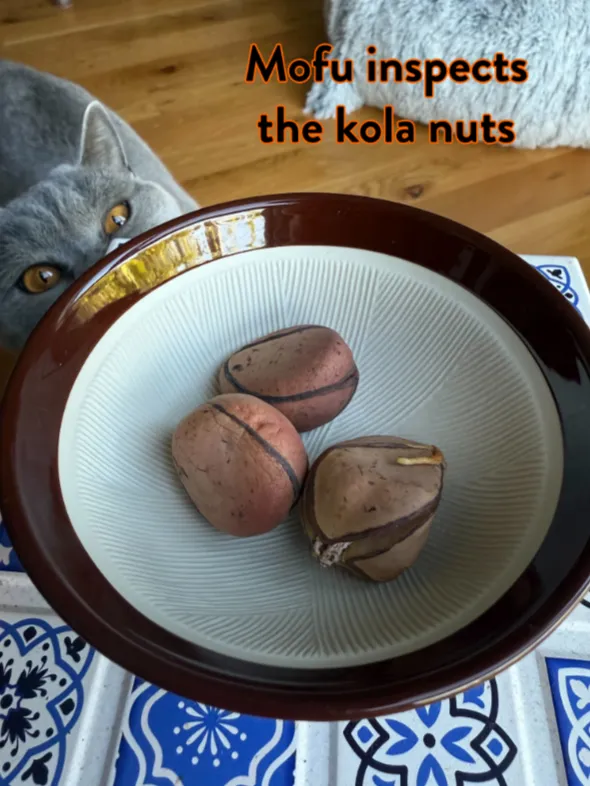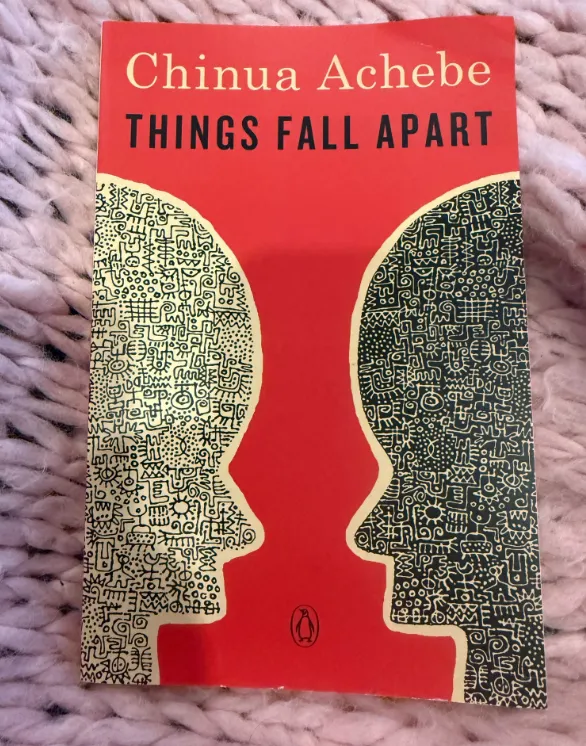Introducing the kola nut
From West Africa comes the kola nut! You may also hear it called bissy/bizzy, obi, or oji. And it’s not a nut! It’s actually the seed of the cola acuminata tree. Yes, it's sometimes spelled with a c and sometimes with a k!

This seed is most commonly associated with Nigeria but is really known throughout Africa and the Caribbean. It seems that unless you have cultural ties to Africa, it’s unlikely you’d have heard of it. And yet it’s pivotal to the naming of one of the most popular brands in American history!
That’s right - the kola nut is where Coca Cola and other cola brands get their naming from. But they’ve long since removed kola nut from their ingredients! The brands seem to have used kola for its caffeine and medicinal properties, but once they learned to get caffeine from other ways they dropped it completely. It’s an extremely rare “spice” in America now. It was not until I started following the craft cola movement in Japan that I learned about the existence of the kola nut. Many small cola brands in Japan are using the kola nut and emphasizing natural ingredients and traditional recipes. I was moved by this and fascinated to learn about something new.
As such, I am but an enthusiastic outsider looking from the outside in on a cultural staple that isn’t my own, so please understand everything I am about to speak about is not firsthand personal knowledge. I would love to learn more directly from someone who has greater ties to the cultures that use and consume kola nut regularly.
Initial research on the kola nut taught me that it’s used not just for the energy boost from caffeine, but also for its effects on digestion, circulation, and anti-inflammation. That’s really cool! I’m not a doctor so I don’t like to speak with authority on its effects and I’m also not trying to sell craft cola as a health drink, BUT! I think it’s important to recognize traditional medicines and how they’ve been used for generations. I personally feel good when I consume craft cola that uses the kola nut. I think these effects are very interesting and compelling.
But the feature of kola nut that was most interesting to me was how it’s used interpersonally. It seems to hold a lot of traditional meaning in some cultures, Igbo in particular. Kola nuts are shared as a gift, when meeting with friends, or to celebrate weddings. I wanted to learn more through literature so I read Things Fall Apart by Chinua Achebe.

I should have read this book sooner! I learned so much about Igbo culture from someone for whom it was firsthand experience. It’s a heavy book that touches on important and real topics, and so I recommend everyone read it. But it isn’t light. But wow did I learn a lot. I love traditions involving giving something to someone else as a customary gift - especially when not rooted in just pure consumerism or pushed by a corporation. It’s a nice gesture that you thought of someone and is something shared by people within a community. It’s really nice to think about and I appreciated how it was used in the book.
I was moved to learn about these traditions and a culture I had little insight into before. Which is why I now feel robbed when finding out the large brands don’t use kola nut anymore! Here’s this seemingly simple item from nature with so much depth and history that has been removed from one of the most common consumer items in the country. I’d say most Americans have heard the word “cola” but have no idea why it’s called that. Its name has been taken and stripped of its parts and the opportunity to interact with a new and interesting natural product has been taken away from us. We have all been robbed of the chance to learn about the kola nut and maintain ties to the culture that introduced it to us!
Maybe I’m being a little extreme? I did argue that it’s OK if someone wants to remove kola nut from their cola recipe, as it’s a decision done with intention. But there’s something about big brands silently getting away with it that bothers me. I want to encourage more intentional consumption - consumption as an opportunity to learn more about what goes into everything around us. There are so many things we regularly interact with that are easy to take for granted and miss the depth and history behind it. Maybe this is overwhelming for people. After all, there’s seemingly a never ending trail of informational depth to really everything. But if we allow ourselves to be curious and wonder, we open up a huge world that connects all of us.
Thank you for taking this opportunity to learn a little bit more about the kola nut from a fellow outsider. As an American, it’s fascinating to see how cola is being treated in Japan with reverence and craft. Sometimes it takes an outsider to notice something within a different culture that is interesting to highlight since we often take our own culture for granted and don’t realize the things that may seem unique to others. This is how I feel about the kola nut. But it’s important to do it with appreciation and respect, which isn't something that always happens both today and historically. I want to act as a launching pad for people to learn and seek out more information on all sorts of spices and traditions. I cannot speak with authority, but instead only be an initial introduction. I am grateful for this opportunity to connect with the world.
I don’t know where this cola journey will lead, but I am honored to have anyone willing to walk alongside me as a fellow wanderer and lifelong curious learner. Do you have personal ties to a culture that uses kola nut? Or did you learn something here and are you curious to learn more about the world and people around you? I’m here with you and would like to hear your thoughts - always!
Wander on,
Wander Cat Cola